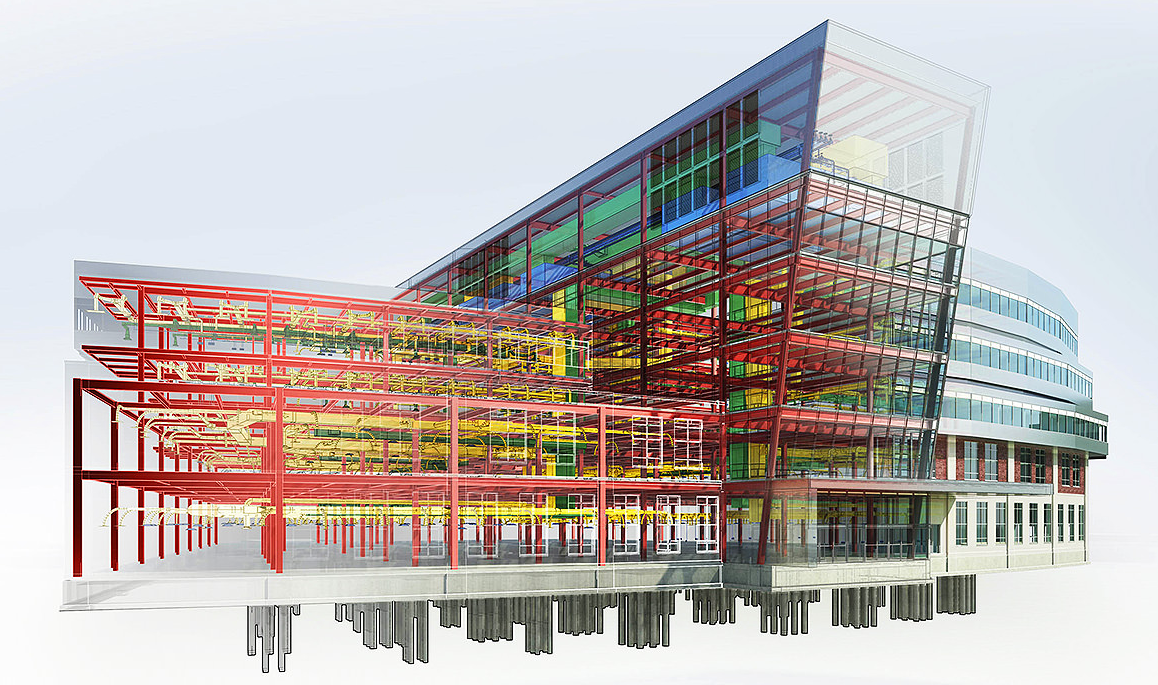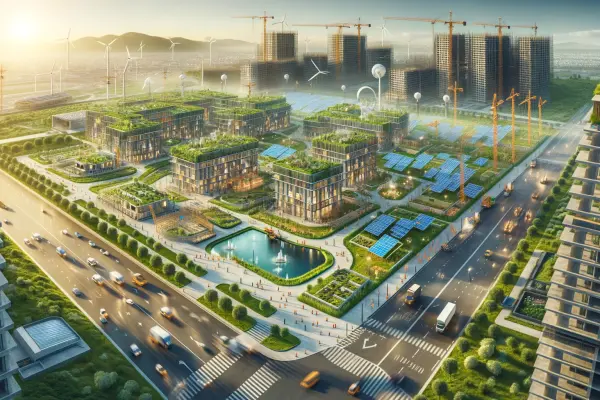In 2025, sustainable construction is no longer just a trend but a vital necessity, with $24.7 trillion in investments projected by the IFC. The construction industry and building operations account for 39% of global CO₂ emissions. The figure is striking. And alarming at the same time. New requirements for sustainable construction are revolutionizing approaches to building design and construction, combining green construction with practical technologies and energy-efficient materials.
Modern environmental construction standards demand a comprehensive approach — from site selection to building operation. In my work with private clients, I often notice a growing awareness of the importance of green certification.
Energy saving in construction is no longer an option. It is the foundation for the industry’s survival amid climate change and increasing energy efficiency requirements.
Mandatory Environmental Standards and Green Certification
 Green construction is no longer a luxury. It is a requirement of the times. In Europe and North America, zero-energy buildings will become mandatory by 2030. LEED and BREEAM certifications have become the gold standard of the industry, covering over 16,000 projects in 50+ countries. Studies show the global spread of green certifications, confirming the worldwide trend toward sustainable construction.
Green construction is no longer a luxury. It is a requirement of the times. In Europe and North America, zero-energy buildings will become mandatory by 2030. LEED and BREEAM certifications have become the gold standard of the industry, covering over 16,000 projects in 50+ countries. Studies show the global spread of green certifications, confirming the worldwide trend toward sustainable construction.
“Investments in energy efficiency pay off within 7-12 years but provide benefits throughout the building’s lifespan,” according to European Commission studies on building energy efficiency.
It should be noted that modern environmental construction standards include biophilic design — integrating natural elements increases occupant productivity by 8-15%. In practice, I often notice that plants in interiors act as a filter for mood and well-being.
Key requirements include assessing the building’s lifecycle, managing water resources, and ensuring indoor environmental quality. Why risk a project’s carbon footprint? Leading universities, such as Harvard, updated their sustainable construction standards in 2024, applying a holistic approach to building design. The cost of green certification ranges from $15,000 to $150,000 depending on the project’s size.
Energy-Efficient Materials and Next-Generation Technologies
The revolution has begun. In laboratories and on construction sites. Energy-efficient materials of 2025 are fundamentally different from conventional solutions. Self-healing concrete with bacteria is undergoing large-scale testing and could extend the lifespan of structures by 20-30% in the long term.
Smart windows automatically adjust transparency, reducing energy consumption by 20%. Phase Change Materials (PCMs) stabilize temperature, significantly reducing the load on heating and cooling systems.
Eco-friendly construction materials include recycled wood, biocomposites, and insulation made from natural fibers. As a result, the carbon footprint of construction is reduced by 40-60% compared to traditional methods.
Can you imagine concrete that heals itself? In one pilot project, the use of experimental self-healing materials showed potential savings of up to $50,000 on preventive maintenance in the first years of operation.
“Geothermal heat pumps provide a coefficient of performance from 3 to 5, making them 3-5 times more efficient than electric heating,” according to data from the International Renewable Energy Agency (IRENA).
New materials include the use of renewable energy sources: integrated solar panels, small-scale wind turbines, and energy storage systems. Integrating all elements is not always easy. But it’s effective.
In one recent project, the use of phase-change materials in walls maintained a comfortable temperature without additional heating even in winter. Innovations in sustainable construction are developing faster than we can implement them.
The following comparative table presents modern energy-efficient materials and their characteristics.
| Material | Energy Saving | Lifespan | Cost per m² | Eco-Friendliness |
|---|---|---|---|---|
| Aerogel Insulation | Up to 50% | 50+ years | $200-300 | High |
| Self-Healing Concrete | 20-30% | 100+ years | $150-250 | Medium |
| Smart Glass | 20-40% | 25+ years | $100-400 | High |
| Phase Change Materials | 15-25% | 30+ years | $80-150 | High |
| Biocomposites | 10-20% | 40+ years | $50-120 | Very High |
This table showcases the variety of modern solutions for sustainable construction and helps select the optimal material based on budget and project requirements.
Digitalization of Construction and BIM Technologies
 The digital revolution has taken over construction sites. BIM (Building Information Modeling) technologies have become mandatory for technically complex projects since 2025. Building information modeling reduces design errors by 20-40% and construction costs by 12-18%.
The digital revolution has taken over construction sites. BIM (Building Information Modeling) technologies have become mandatory for technically complex projects since 2025. Building information modeling reduces design errors by 20-40% and construction costs by 12-18%.
Leading industry companies, including Autodesk, Bentley Systems, and Trimble, are investing billions in developing BIM platforms. The Internet of Things (IoT) in construction transforms ordinary buildings into smart ecosystems.
Sensors monitor air quality, energy consumption, and structural integrity in real-time. It is known that this approach can prevent up to 80% of critical issues during the design phase.
“A BIM model of a building is its digital twin, which lives and evolves alongside the real structure throughout its lifecycle,” according to the definition by buildingSMART International, a global organization for BIM standardization.
Building Management Systems (BMS) integrate with artificial intelligence to optimize energy consumption. In one project last season, implementing smart construction technologies reduced operational costs by 25-35%.
Main Barriers to Adopting Digital Technologies
The transition to digitalization faces significant obstacles. High initial investments in software can reach $500,000 for large projects.
A shortage of qualified personnel slows adoption. Industry studies show that about 70% of construction professionals require additional training to work with BIM technologies. Resistance to change among experienced engineers creates further challenges.
Energy Efficiency Requirements in Construction and Renewable Energy Sources
 Energy-efficient construction is becoming the de facto standard. Class A buildings consume 80% less energy than traditional structures. Passive houses and zero-energy buildings are not a utopia but a reality in 2025.
Energy-efficient construction is becoming the de facto standard. Class A buildings consume 80% less energy than traditional structures. Passive houses and zero-energy buildings are not a utopia but a reality in 2025.
Renewable energy sources are integrated directly into building architecture. Solar panels are embedded in facades, and roofs are equipped with wind turbines. It is known that geothermal systems provide heating and cooling with a coefficient of performance from 3 to 5, significantly more efficient than traditional systems.
“Our home is about comfort and sustainability. We not only save money but also feel we’re contributing to environmental protection,” is a typical review from owners of passive houses in Northern Europe. Statistics show that families in energy-efficient homes of 160 m² with investments of about €300,000 reduce annual energy costs from €2,400 to €150-200, as confirmed by data from the European Passive House Institute.
Energy efficiency requirements are tightening every year. In one project last season, integrating smart energy management systems reduced consumption by 45%.
Considering structural features, modern buildings integrate battery systems to store excess energy. The payback period for such investments is 8-12 years, with equipment lifespans of 25+ years. Why don’t all developers choose energy-efficient construction?
Social Aspects of Sustainable Construction
Sustainable construction addresses not only environmental challenges. Social responsibility includes creating affordable housing and improving community quality of life.
Green buildings reduce asthma rates by 40% due to improved air quality. Natural lighting increases productivity by 12-15%. It should be noted that such projects create 25% more jobs during construction.
Affordable green housing is becoming a priority. Social construction programs integrate green technologies, reducing utility bills for low-income families by 30-50%.
Innovations in Sustainable Construction
 3D printing of buildings is revolutionizing the industry. The technology reduces waste by 60% and construction time by 70%. Modular construction is gaining momentum — elements are manufactured in factories with millimeter precision.
3D printing of buildings is revolutionizing the industry. The technology reduces waste by 60% and construction time by 70%. Modular construction is gaining momentum — elements are manufactured in factories with millimeter precision.
Digitalization is penetrating all construction processes. In practice, I notice that even small contractors are starting to use BIM for planning. Robotic systems and drones monitor work quality automatically.
Biomimetic technologies (mimicking natural processes in architecture) replicate natural systems. Building facades imitate leaf structures for maximum sunlight absorption. What if buildings could breathe like living organisms? Ventilation systems operate on the principle of termite mounds, creating natural air circulation.
Trends in Sustainable Construction by 2030
The industry’s future is being shaped today. By 2030, widespread adoption of artificial intelligence in building management is expected. AI will predict maintenance needs six months before issues arise.
Vertical farms will be integrated into residential complexes, providing residents with fresh produce. Nanotechnology will create materials that self-clean and absorb air pollutants.
Carbon-negative buildings will become a reality — they will absorb more CO₂ than they produce. New construction requirements are shaping the standards of the future today. Leading the way are Microsoft, Google, and integrated development companies like Skanska and AECOM.
Economic Aspects and Investments in Construction
Sustainable construction requires investment. Initial costs are 10-20% higher than traditional methods, but operational savings recoup investments within 5-10 years. Global investments in green construction will reach $24.7 trillion by 2030.
Government support programs include subsidies covering up to 30% of project costs, preferential loans, and tax incentives. Insurance companies offer up to 15% discounts for green buildings due to reduced risks.
The cost of green construction ranges from $1,200 to $3,000 per m², depending on certification level and technologies used. However, the market value of such properties is 10-20% higher than their counterparts.
Main Obstacles to Industry Development
Financial barriers remain the primary challenge. Banks are reluctant to finance innovative projects due to a lack of risk statistics. Regulatory restrictions hinder the adoption of new materials and technologies.
Client conservatism impedes sustainable construction progress. Only 34% of clients are willing to pay extra for eco-friendliness. A lack of information about long-term benefits exacerbates the situation.
Sustainable construction requires a comprehensive approach and long-term thinking. The technologies exist, the economic model is established, and what remains is overcoming psychological and institutional barriers. The industry’s future depends on the readiness of all market participants to adopt new standards today.

